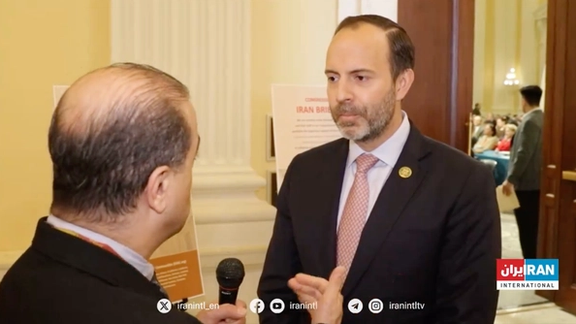US Lawmakers Support Potential Israeli Retaliation Against Iran

Several Republican and Democratic lawmakers have endorsed a potential Israeli retaliatory attack against Iran, branding the Biden administration too soft on its archenemy.

Several Republican and Democratic lawmakers have endorsed a potential Israeli retaliatory attack against Iran, branding the Biden administration too soft on its archenemy.
The congressmen told Iran International that they viewed Iran's attack over the weekend as a failure but believed Israel's response was "necessary".
“If they [Iran] intended to create a lot of chaos and cause damage in Israel they weren't successful,” but the Iranian regime “crossed the red line,” Republican Representative (R-TX) told Iran International.
Representative Steve Cohen (D-TN) believed the escalation did not start with Israel killing IRGC commanders in Iran’s consulate in Syria earlier this month, which Tehran claims was the trigger for the aerial bombardment this weekend, as the regime was involved in Hamas’ October 7th attack against Israel.
“This has been going on for a while as Iran trained some of the leaders of October 7 in the country,” he explained. Iran-backed Hamas invaded Israel on October 7, killing 1,200 mostly civilians and taking over 250 more hostage.
Earlier this month, an alleged Israeli air strike hit the Iranian consulate in Damascus, killing a senior Quds Force commander and several other IRGC personnel. Tehran claims the weekend's bombardment of over 350 missiles and drones was an act of self defence in response to the strike.
Democrat Cohen said the operation was done with the intent to “kill people”. He added, “Israel will respond. And I support Israel.” The majority of the projectiles were intercepted on Saturday night by Israel and its allies including the UK, US, Jordan and France in one of the most complex aerial missions in modern warfare.
Biden has stated the US will not take part in any Israeli attack against Iran, though says it will support the Jewish state in the face of attack. Since the Biden presidency began, Tehran has become ever more emboldened, including accelerating its nuclear program.
The Republican Party has long criticized the policies enacted by the Biden Administration regarding Iran. Biden has come under fire for releasing $6 billion of Iranian oil revenues in September as part of a prisoner exchange agreement and also for granting Iraq a new four-month waiver that enabled the release of billions of dollars to Iran after the October 7 terrorist attacks.
Despite the humanitarian guise, Republicans and Democrats challenged these decisions, arguing that money's fungibility would enable the Tehran regime to divert these funds towards arming its proxies.
Republican Representative Don Bacon (R-NE) stated that “there's a greater risk by being weak in our response to Iran,” as it would lead to a more aggressive response on the part of the regime.
"The Islamic Republic wants to be a caliphate. They want to control the Mideast, have a Shia empire there," he said, adding that "Iran wants to be the regional superpower, and that would be bad for America and bad for our allies."
Republican congressman Randy Weber (R-TX) told Iran International that times must change and a new approach taken with Iran which has been emboldened under Biden. “He's [Biden] giving Iran billions of dollars when we should have had sanctions. They should have been tight. The sanctions should not have been lessened,” he said.
While the White House announced on Tuesday that fresh sanctions would be imposed on Iran, analysts believe that the US will not initiate drastic sanctions on Iran because it is worried about increasing oil prices and angering its top customer, China.
Former president Donald Trump, who Biden is running against in the upcoming presidential elections, has already blamed the ageing president for the Iranian attack on Israel. “It [the aerial bombardment] would not have happened if we were in office,” Trump said in the wake of the bombardment on Sunday.
Under Trump, policies to Iran took a much tougher stance. He pulled out of the JCPOA nuclear agreement and in 2020, the commander of Iran's Quds Force, Qassem Soleimani, was assassinated in an airstrike in Iraq.